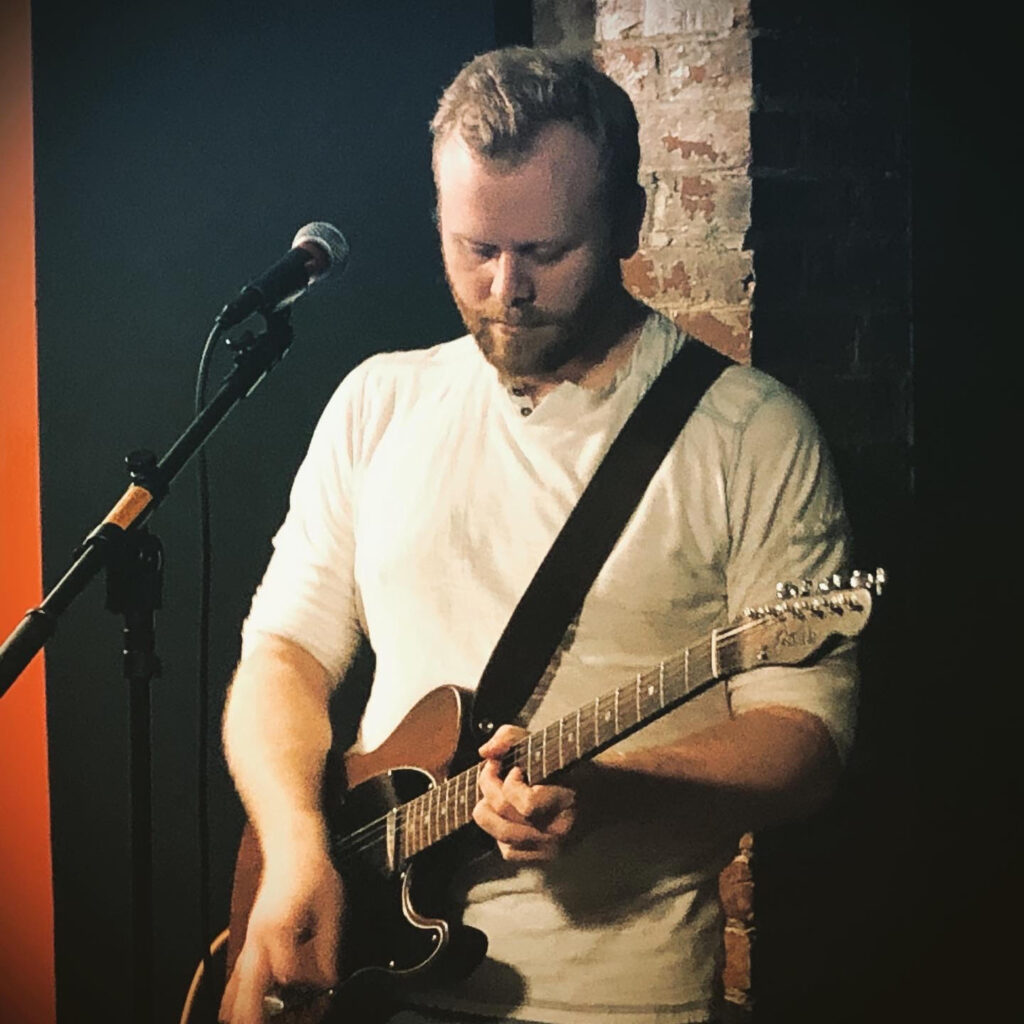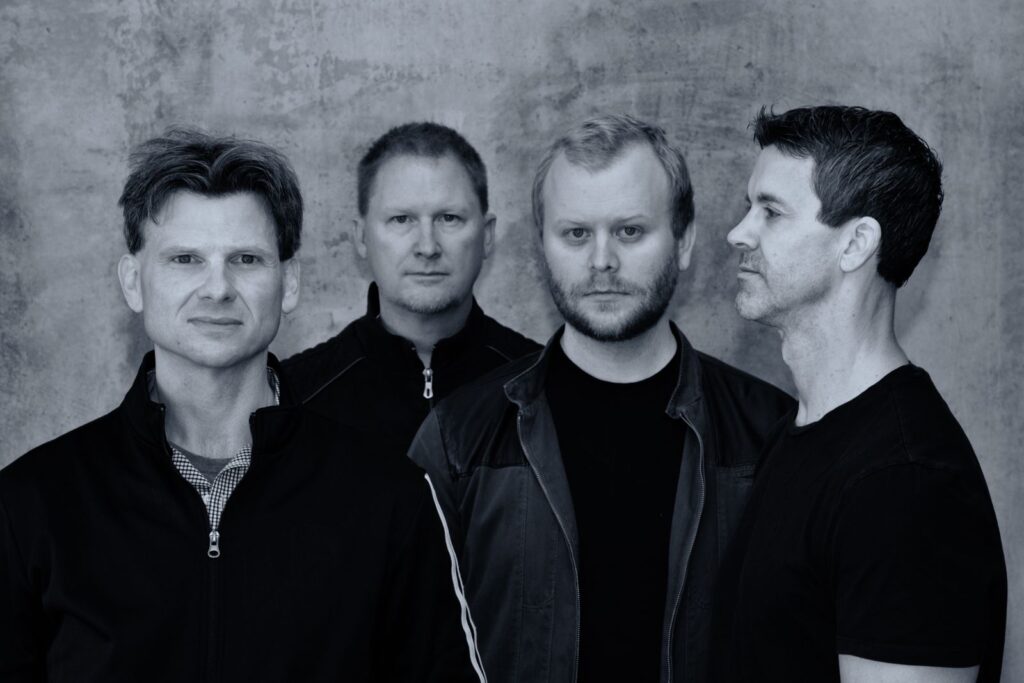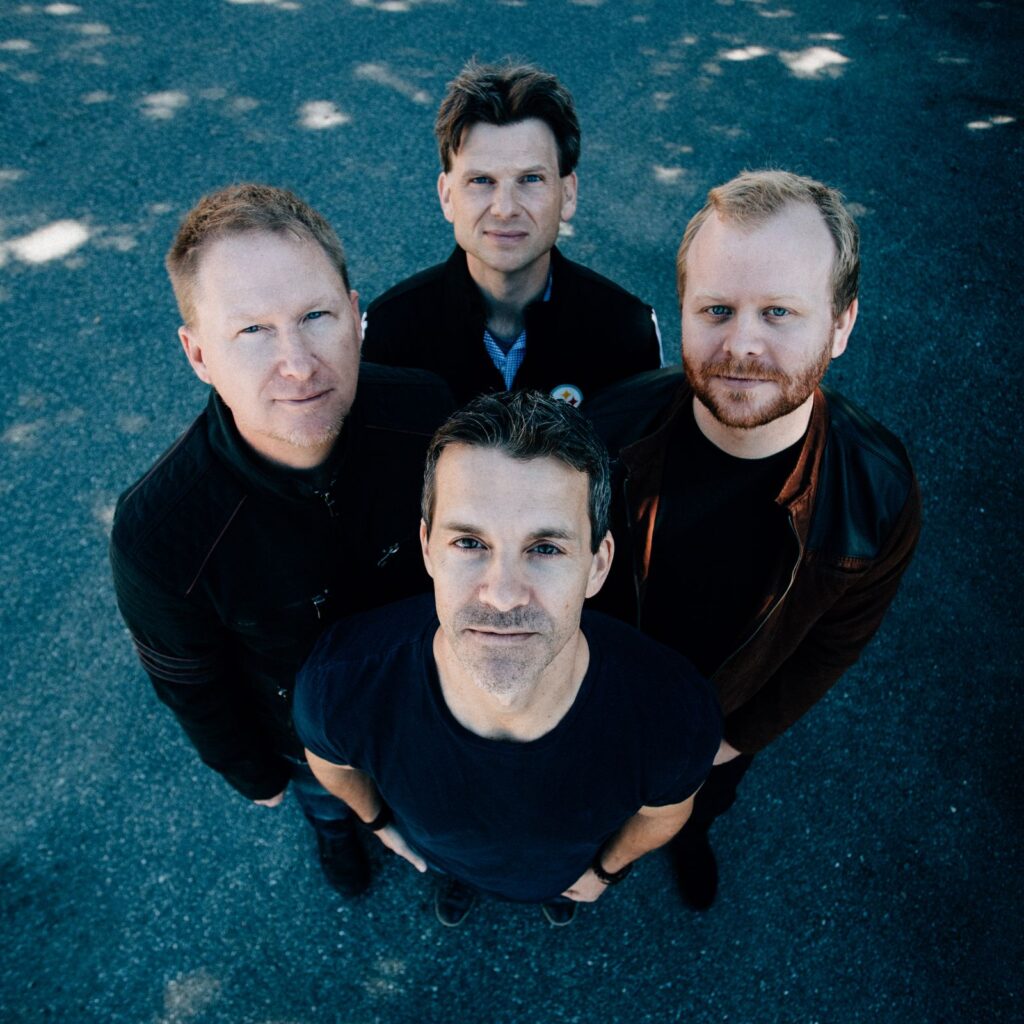By: Rick Landers

Chris Waldrop of U2TOPIA
Rock guitarist, Chris Waldrop, hails from the metropolitan Washington, D.C., area where he helps draw a crowd to hear the driving rhythms and guitar riffs of U2TOPIA, a band that pays tribute to one of most well-known bands on the planet, U2.
While tribute or cover bands oftentimes feel the derisive heat from other musicians for playing well-known bands’ songs, they do attract their own fans for various reasons, one being that the original bands aren’t as accessible, as well as charge astronomical ticket prices.
And, it shouldn’t be forgotten that traditionally many popular group gained traction paying respect to their own music heroes.
Famous artists like The Beatles, The Rolling Stones, Bonnie Raitt, Bob Dylan, Cat Stevens, Led Zeppelin,Stevie Ray Vaughan and Double Trouble and plenty more solidified their fan bases with covers of their predecessors like Little Richard, Chuck Berry, Woody Guthrie, Jimi Hendrix and more. And if you roll back the years, we’re talking about a standard folk and blues hand-me-down tradition of musicians for centuries.
The key is to get it right, whether you’re working to sound as close to the original as you can, or to reimagine an older song or songs, and cue things up as something innovative, surprising, even delightful.
Defensive? Yeah, well maybe, but there are cover bands all over the planet. They make people bump and grind, and they put bucks in the pocket of professional musicians in a profession where working is referred to as “playing”.
So, let’s give credit due where credit is deserved and not only Chris Waldrop, but his band of brothers in U2TOPIA deserve a hand for nailing down some very cool U2 songs to pump up the volume to rattle and hum the local D.C. crowd of U2 fans and other music enthusiasts. And the group plays some of the best venues in the area, proving their talent is not only appreciated, but valued and sought.
U2TOPIA also includes, Brett Swierczewski on percussion, Mike Mincin who hammers out those Bono vocals and some acoustic guitar riffs, and newcomer, Skip Daly, who has a great reputation as an all-round percussionist. With Waldrop on board playing lead guitar, the four have built a reputation as one of the best U2 cover bands, not only in the DC-MD-VA metropolitan region, but have fans throughout the States.
Guitar International got a hold of Chris to find out more about his rising professional music career, the gear he’s gathered to help emulate the U2 sound, and about how the band got together to form a group that’s not only technically in synch, but sonically fused to get us to the point where when we close our eyes, we get into that cool Irish rock U2 vibe.
******
Rick Landers: Can you tell us a bit about your background, including what drew you to the guitar and why you decided to strap one on and learn to play?
Chris Waldrop: Both of my parents love music, and that naturally made its way to me. My mom plays piano, and my dad always has great music playing in the house. Hearing all that music is most certainly what drove me to want to play guitar. I can remember specifically a few concert DVDs that made me want to play guitar.
The Eagles – Hell Freezes Over (I always cite Joe Walsh as my first influence on guitar), Fleetwood Mac – The Dance, and Led Zeppelin – The Song Remains The Same. These were in constant rotation when I first started playing guitar.
Rick: What songs grabbed your attention that made you a fan of U2? Were they the same songs you first learned to play?
Chris Waldrop: The two biggest songs that stick out in my early U2 memory are “Zoo Station” and “Bad.” More specifically from the concert videos Zoo TV Live In Sydney and Rattle & Hum. Zoo Station stuck out to me when I was very young when we were watching on LaserDisc, because the visual aspect of that performance is just so wild. And the super distorted guitar and drums, what’s not to love?
As far “Bad”, some performances of this song are just so extraordinary, this is one of them. I don’t really remember the first U2 song I learned. I probably tried to learn “Bad”, but without the delay pedal, my parents probably just smiled and said, “Good job.”

U2TOPIA (L to R) – Brett Swierczewski (percussion); Skip Daly (bass); Chris Waldrop (guitar/keyboards); Mike Mincin (vocals/guitar)
Rick: How and when did you get the idea to form U2TOPIA? Had you played U2 music in other bands before this or solo?
Chris Waldrop: I had been playing in a U2 band in Texas when I lived there. I had so much fun playing these songs, I knew I wanted to continue doing that when I moved to D.C., in 2019. Luckily I was able to hook up with drummer and fellow U2-nerd, Brett Swierczewski, and we started U2TOPIA, although we had a few different names before that.
Rick: I’d think you at least considered figuring out what gear you should have to get an identical sound like The Edge, right? Amp? Guitars? Effects?
Chris Waldrop: Oh yeah, for sure. There’s so much information out there about the gear and effects The Edge uses or has used at some point, it can be a little overwhelming. I think the basics to get someone really really close to the U2 sound, is a Strat, a Vox amp, and a delay pedal. I’ve got a little bit more than that.
The guitars I’m currently using with U2TOPIA include a Fender Stratocaster The Edge signature model that I tune to Eb that’s really perfect for the clear chime sound The Edge is known for. I also have a Fender George Harrison rosewood Telecaster, that I tune to E. I think this is the favorite guitar I own. Not only is it the most beautiful guitar I think I’ve ever seen, it is also remarkably versatile for only having two pickups. I think that goes for most Telecasters.
In the mix is my Gibson 1956 Reissue Gold Top Les Paul with a Bigsby. I tune that to Eb. This is a close second for most beautiful guitar. There’s something about a gold Les Paul with P-90’s and a Bigsby vibrato. It also has a huge neck which I love and feels great.
My amp is a Vox AC-15. Purists will say I need the AC-30, but it’s a bit easier to carry an AC-15.
As far as effects, you’re catching me at a time when I’m going to be changing up my pedalboard, but right now I am using a Line 6 Echo Park for the delay. It is a perfect delay pedal with the dotted 8th note setting and tap tempo, as well as the digital and analog sounds and adjustable modulation.
For distortion, I’ve got the Band of Gypsys Fuzz Face for the heavy distortion, and a Death By Audio Interstellar Overdriver.
I use an EVH Wah mainly just on The Fly and an Emma DiscumBobulator auto-wah for Mysterious Ways. I have an old Korg A3, the same thing The Edge uses to get the Mysterious Ways sound, but the problem with vintage gear, is that it’s old, and not always reliable.
For some of the more ethereal sounds I use an Eventide Space. A JHS Unicorn for the univibe/tremolo effects. And for the octave effects, I have a Digitech Whammy Ricochet, just as easy to use as the regular Digitech Whammy, but doesn’t take up as much space on the pedalboard.
I recently got one of the Korg SDD-3000 pedals that were designed specifically for The Edge by his guitar tech, Dallas Schoo. It has the same delay and preamp sound that was in the original units in the ’80s that helped to give him such an iconic sound. I am excited to use it on our upcoming shows.
Also, the not-so-secret, secret to Edge’s sound is the dimpled Herdim guitar picks that he holds backwards to use the dimpled side on the strings to get a sharp attack on the strings. I actually use the Snarling Dogs Brain picks – the orange ones. It has the same dimpling, but I prefer these because they’re much heavier [1.14 mm].
Rick: What other guitars do you own, electric and acoustic, and have you ventured into other instruments?
 Chris Waldrop: These are the other guitars I currently have, a Fender ’68 Strat reissue with the Hendrix reverse headstock and reversed pups. I also have an Ibanez ORM-1
Chris Waldrop: These are the other guitars I currently have, a Fender ’68 Strat reissue with the Hendrix reverse headstock and reversed pups. I also have an Ibanez ORM-1
Fender ’68 Reissue Stratocaster – this model is a bit of a Hendrix vibe, with the reverse headstock as well as the reversed pickups. Another of my favorite bands is The Mars Volta, this is the short-lived signature guitar from their guitarist Omar Rodriguez Lopez. It’s not a very versatile guitar, but still fun to play.
I’ve got an Epiphone EJ-160E that I have out all the time, so I can just pick it up and play whenever an idea strikes.
I also play bass and keys. I have a Fender Mustang Bass and a small Korg Reface CP keyboard. I also love playing the drums, but would not quite call myself a drummer.
Rick: In a general sense, I imagine it’s quite a challenge to recreate the sonic landscape of U2, with the lush production, and all of the various components in those studio arrangements. How are you managing that, and what’s the most challenging aspect of it?
Chris Waldrop: We’ve created and use backing tracks on a number of the songs to fill out that space. Many of these tracks are integral to the songs. I think there was a bit of hesitancy from all of us to start using them, as we’d be relying on something that wasn’t played live, and we all love the spontaneity of live performance.
I think that was the biggest challenge, incorporating these into our sound and playing to a click track, something most of us were not familiar with. But, after a few rehearsals with it, it came together really nicely.
Rick: Who else is in the group and how did the band get together, from the beginning and what process did you have when pulled you latest player on bass, Skip Daly, who’s a big RUSH fan, to the point that he spent nearly a decade writing a book about them?
Chris Waldrop: The group started with myself and Brett Swierczewski, on drums. It took us a while to find a suitable singer. For a while I contemplated playing guitar and singing lead, but we were very lucky to find Mike Mincin to give us his amazing voice, and I was put in a more suitable position of backing vocals. Mike also fills a lot of space playing acoustic guitar and keys on a lot of songs.
We held auditions for bass players earlier this year, and as soon as we heard Skip, we knew he was the bass player for us. His musicianship and personality made him the perfect match for our group. I was so impressed finding out he had written the book, Rush: Wandering the Face of the Earth: The Official Touring History. He has brought that same passion and drive to U2TOPIA. I think in his audition we actually played “Red Barchetta.”
Rick: U2TOPIA does a pretty amazing job of pulling off songs that sound like they would be very tricky to create. Something like “Where The Streets Have No Name.” You can’t pull that off half-way; that sound has to be there, fully-realized, or else it’s going to fall flat. How and when did you come to realize that this could be made to work?
Chris Waldrop: For “Where The Streets Have No Name,” specifically, that is such an iconic song in the set, we know we have to make that one a big moment each time we play it. It’s also one of my favorites. I think that excitement that we all still feel when playing these great songs helps to push them to that next level, and I think the audience recognizes and responds to that.
Chris Waldrop: Brett, Mike, our previous bass player, Ken, and I got together right around February of 2020, and we all know what happened right after that. Luckily, we were still able to get together in a safe, socially-distanced way and rehearse in backyards or garages. And during the pandemic, we played several outdoor shows in the D.D., Maryland, and Virginia (DMV) area and had great turnout. Now that Skip has joined us, we are heading for even bigger and better things, like our upcoming indoor shows at The State Theatre and Jammin’ Java, here in Northern Virginia.
All four of us are doing this because we love these songs and have fun playing them. I think that goes a long way in keeping things fun and not getting too stressful. Mike and Skip have both brought a level of professionalism to this group that I think both Brett and I were previously unaware of. They’ve both played venues all over the DMV area, so they have the knowledge and experience dealing with venues and all that comes with being in a performing group.
Rick: Where do you all want to be in five years or twenty years from now? Still cranking out U2 songs or do you think you’ll all venture off into independent projects?
Chris Waldrop: I really don’t know. That’s hard to say. This group is still relatively new and we are all having so much fun doing this. We’ve all played in different bands in the past, both original and cover bands. And both Skip and Mike have other groups that they occasionally play with now. So there’s nothing stopping us from doing different things. But right now, I think we’re all really enjoying playing in U2TOPIA.
Rick: COVID-19 is still with us, now with variants. Have you figured out how to put on a virtual show and keep everything synched and the sound quality top notch, or have you been waiting it out, waiting for it to subside, or maybe playing outdoor gigs?
Chris Waldrop: We’ve talked about the possibility of doing a virtual gig. I’m a little hesitant on that, because without the audience, it will basically feel like a glorified rehearsal. And we’ve had so much success with our outdoor shows. I think it would be hard for me to go from playing to an audience to performing without one. But nothing is off the table!

U2TOPIA – Clockwise from Top: Brett Swierczewski (percussion); Chris Waldrop (guitar/keyboards); Mike Mincin (vocals/guitar) and Skip Daly (bass).
Rick: Have you had a chance to meet The Edge or other members of U2. If so, how’d that go and if not, how would you go about getting close enough to actually speak with them?
Chris Waldrop: Unfortunately, I have not had the opportunity to meet anyone in U2. The closest I got was I was in Chicago for a U2 show in 2015, and when walking down the street, my brother and I saw Larry Mullen Jr’s drum tech, Sam O’Sullivan, on the other side of the street.
U2 is famous for greeting fans waiting outside the venue before a show starts. That’s probably the best andonly way I’d be able to meet them, or have a chance to say anything to them. As for what I would say, I don’t know, I’d probably be too nervous to say anything.
Rick: What else do you have going on as far as artistic endeavors, new projects, dream guitars, and expanding the bands territorial reach?
Chris Waldrop: U2TOPIA is my main focus right now, but I’m always playing guitar and coming up with new ideas and riffs to keep in my back pocket. As for dream guitars, I think I’m pretty happy with the guitars I have. But, if I could ever find a Martin 00-21 that I could afford, I’d be happy to add that to my collection.
U2TOPIA has been doing a great job of spreading the word around the entire DMV area. We’ve played shows in Virginia and Maryland and just performed our first show in D.C., and then we’ll have two upcoming shows at Northern Virginia’s State Theatre (12/9) and for next year, we’ll be playing Vienna, Virginia’s, very popular club, Jammin’ Java (1/13).